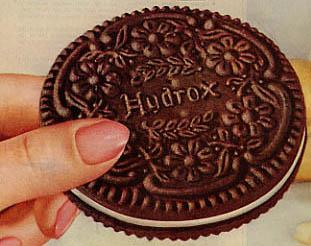 As a young lad, I would consume entire packages of Hydrox cookies, to the consternation of my mother.
As a young lad, I would consume entire packages of Hydrox cookies, to the consternation of my mother.
Even into adulthood, I never kicked my Hydrox addiction, always preferring those creme-filled chocolate goodies to Oreos.
Turns out that many others across the USA felt the same way. We’ve collectively mourned the death of this product since 2003.
Sunshine Biscuits created Hydrox in 1908, it’s name a contraction of hydrogen and oxygen. Then, it experienced competition from Nabisco’s Oreo in 1912. Nabisco outmarketed Sunshine for nearly a century, but die-hard Hydrox fans never wavered.
After several stumbles, Sunshine sold itself to Keebler in 1996. That was the beginning of the end: Keebler poured more sugar into Hydrox, changed the name to Droxies, and targeted the product to, you guessed it, children. Abysmal failure. Kellogg, which bought Keebler in 2001, gave Hydrox an anemic, perfunctory shot and then shuttered it two years later, in 2003.
The following for Hydrox has been so loyal, widespread, and steadfast that fansites emerged all over cyberspace to protest its demise. Think about it: how many products exist that engender so much passion and devotion? Not many. But, Hydrox is such a product. The sad part is that its owner, Kellogg, didn’t realize it — until now.
So, in August 2008, after five years of hearing from this coveted cookie’s numerous acolytes, Kellogg reintroduced Hydrox for a “limited edition” centennial celebration. Limited edition? Hedging its bets? In other words, Kellogg still doesn’t get it, still doesn’t believe its loyal customers.
Management by Spreadsheet
Why didn’t Kellogg realize its own brand loyalty, its own product potency? Without knowing firsthand, I surmise that beancounters, who know nothing about customers, were put in charge of marketing: management by spreadsheet.
How many times, for example, have managers looked great on paper and performed miserably on the job? Plenty. By the same token, a product might look bad on paper but be a huge winner. That’s why a visceral feel for nuance and the intangible — both absent in numbercrunching — is what makes a great marketer.
Compare Kellogg’s remote, detached, out-of-touch M.O. with how Mickey Drexler, CEO of J.Crew, markets his company’s products. Drexler, who believes that “retail is detail,” manages by walking around. If he spots a trend in one of his stores, or out in the street, it can become a new product in two weeks. No market research. No analysis paralysis. Drexler knows what the customers want, knows how to act on what his gut tells him — the cornerstone of GutShare™.
Second Chances
It is totally inexcusable for a vendor not to know how its customers feel about its products. To ignore customers who are rabid fans is an even-bigger error. Yet, Kellogg is guilty of this in the case of Hydrox. Yes, Kellogg is reintroducing this great product, but it is hedging while doing so by calling it a “limited edition” test.
David Mackay, CEO of Kellogg, has the formula for making Hydrox a whopping success, from this point forward: a proven, loyal base of die-hard fans who have clamored five years for this beloved product’s return. This is a milestone companies live to achieve!
It’s now a matter of Mackay investing the appropriate time, people, and dollars into giving Hydrox fans what they want to buy. Or, alternatively, Mackay could waste shareholder capital on exploring the unproven potential of untested products with no die-hard fans. Could his decision be any easier?
Let the Hydrox story be a lesson to all vendors that don’t know or ignore their customers: second chances to be successful are rarer than first chances.
POSTSCRIPT #1: Hydrox Woos With Real Sugar — and Donald Trump (09.04.15)
© 2008 Marc H. Rudov. All Rights Reserved.
About the Author

Marc Rudov is a branding advisor to CEOs,
producer of MarcRudovTV, and author of four books

